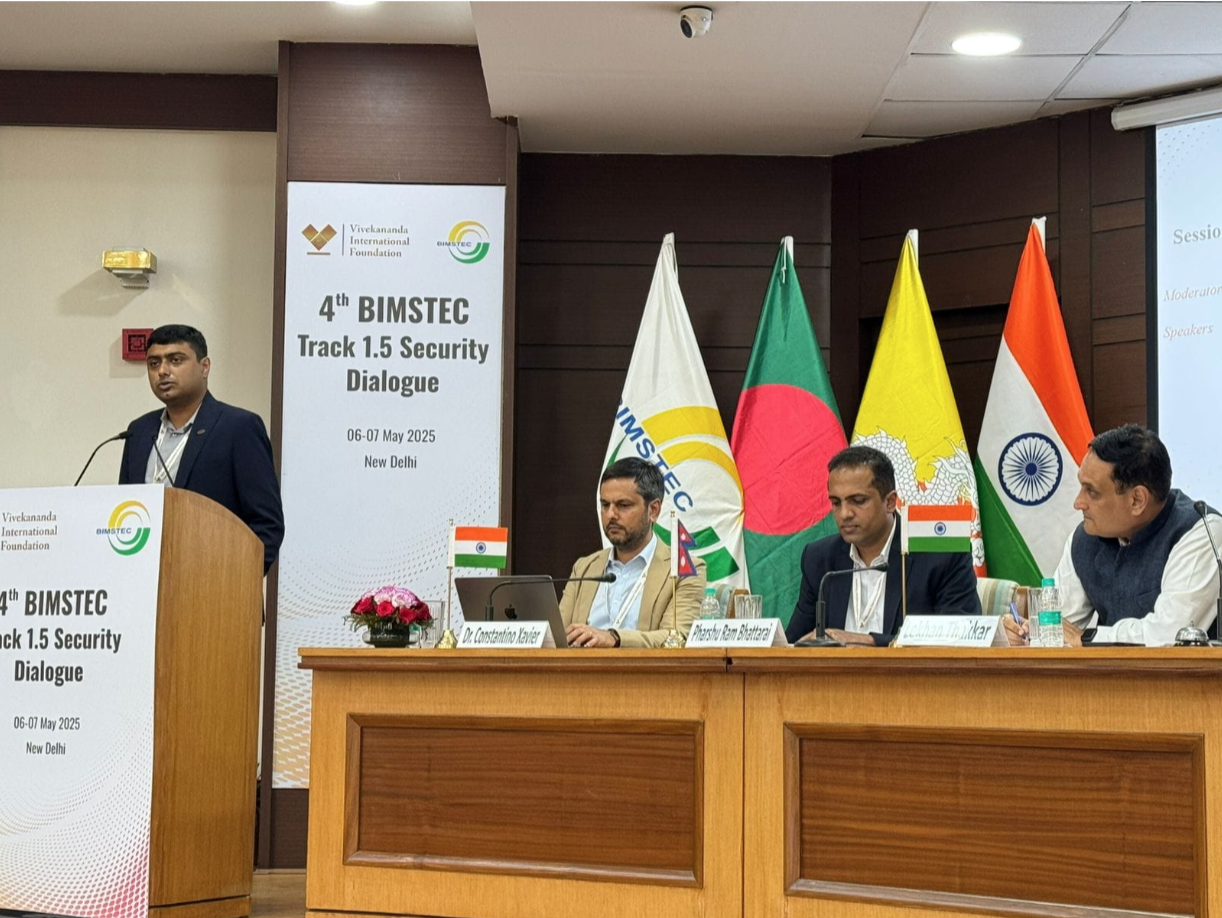
I had the honor of attending the 4th BIMSTEC Track 1.5 Security Dialogue, held from 06–07 May 2025 in New Delhi, India, as part of the Government of Bangladesh delegation. The program was co-hosted by the National Security Advisor Secretariat (NSCS), Prime Minister’s Office, India, and the Vivekananda International Foundation (VIF). I was nominated by the Bangladesh Institute of International and Strategic Studies (BIISS) to represent Bangladesh at this important regional dialogue focusing on emerging security challenges in the Bay of Bengal region.
The event gathered representatives from all seven BIMSTEC member states — Bangladesh, Bhutan, India, Myanmar, Nepal, Sri Lanka, and Thailand — to deliberate on the evolving security landscape. The dialogue addressed five key themes: maritime security, economic security and connectivity, transnational organized crime, cybersecurity and emerging technologies, and the role of Track 2 dialogues in strengthening BIMSTEC cooperation.
Nature of Engagement
I participated as a panel speaker in Session 2, titled “Economic Security and Connectivity in the Bay of Bengal Region”, moderated by Mr. Lekhan Thakkar, Joint Secretary, NSCS. The other speakers were Dasho Karma Tshiteem (RIGSS, Bhutan), Mr. Pharshu Ram Bhattarai (MHA, Nepal), and Dr. Constantino Xavier (CSEP, India). My presentation was titled “Economic Security and Connectivity: Towards a Whole-of-BIMSTEC Approach”, reflecting Bangladesh’s vision for resilient and inclusive regional economic cooperation.
Key Issues Delivered
In my lecture, I emphasized the pressing need to strengthen economic security through regional connectivity, resilient supply chains, and financial integration — themes directly aligned with the Concept Note’s focus on economic interdependence and supply chain stability.
Key recommendations from my speech included:
Developing Resilient Supply Chains:
Establishing a BIMSTEC Regional Supply Chain Resilience Mechanism to identify chokepoints and map critical sectors.
Promoting regional sourcing agreements and co-production ventures to enhance intra-BIMSTEC value chains.
Creating a BIMSTEC Logistics and Connectivity Hub Network, where Bangladesh could serve as a bridge between South and Southeast Asia, capitalizing on its robust manufacturing sectors.
Enhancing Trade Facilitation:
Harmonizing customs processes through a BIMSTEC Single Window System and developing a Digital Trade Corridor using blockchain and e-certificates to reduce costs and delays.
Promoting Mutual Recognition Agreements (MRAs) for technical and sanitary standards to eliminate non-tariff barriers.
Strengthening Financial Integration:
Proposing a BIMSTEC Financial Connectivity Framework to harmonize regulatory systems and improve cross-border payment mechanisms (including central bank digital currencies).
Establishing a BIMSTEC Investment Facilitation Framework to attract FDI and coordinate investor protection and dispute settlement mechanisms.
Advancing Transport and Port Connectivity:
Fast-tracking the BIMSTEC Motor Vehicle Agreement (MVA) and establishing a BIMSTEC Port Alliance for integrated port development and digital capacity building.
These proposals directly echoed the Concept Note’s call for applying an “economic security lens” to regional connectivity and trade initiatives, ensuring the region’s resilience against external disruptions such as global crises, geopolitical tensions, and climate-induced shocks.
Relevance and Strategic Impact
The discussions during the session resonated with the Concept Note’s emphasis on a “whole-of-BIMSTEC approach” to secure supply chains, strengthen trade integration, and advance digital and physical connectivity. My intervention contributed to shaping the regional narrative that economic interdependence can be leveraged as a strategic enabler of peace and stability. It also aligned with the session’s guiding questions on resilient supply chains, trade facilitation, financial harmonization, and transport connectivity.
Professional and Institutional Outcomes
Representing Bangladesh and BIISS at this dialogue enhanced my professional understanding of the evolving nexus between economic and security policies in the Indo-Pacific context. Engaging with policymakers and scholars from across the region provided a unique opportunity to contextualize Bangladesh’s strategic priorities within a broader regional framework. The exchange of perspectives enriched my ongoing research on economic security and regional integration, particularly in the Bay of Bengal.
For BIISS, this participation elevated the institute’s visibility within the BIMSTEC network of policy forums. Our engagement showcased BIISS’s research expertise in non-traditional security and economic cooperation, reinforcing its position as a key policy think tank supporting Bangladesh’s strategic diplomacy.
In conclusion, the 4th BIMSTEC Track 1.5 Security Dialogue underscored the critical role of economic security and connectivity in shaping the Bay of Bengal’s future. My participation not only represented Bangladesh’s constructive policy stance but also contributed to advancing regional cooperation for a more secure and prosperous BIMSTEC community.